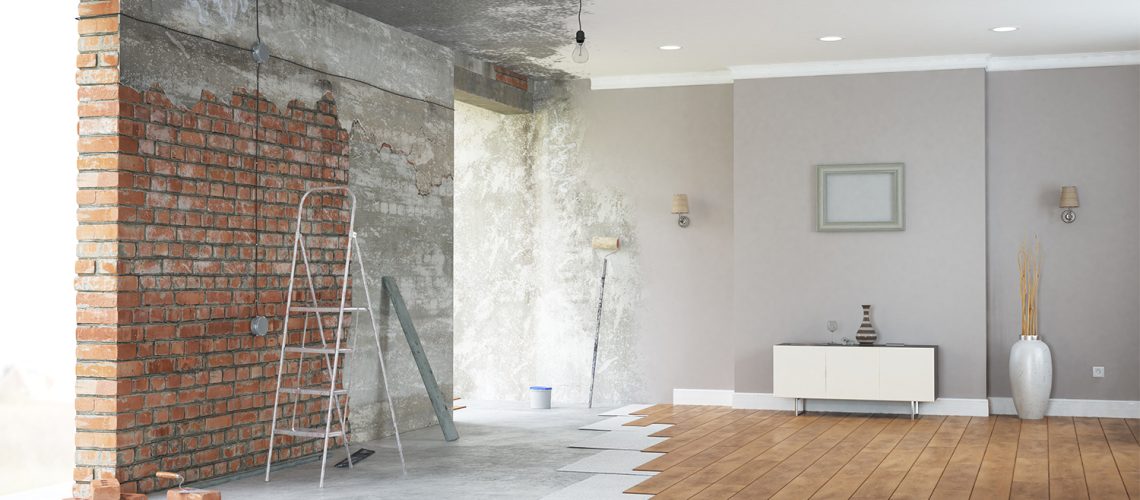Buying a new home is a very exciting experience. It’s a chance to start fresh and create new memories in a special place. Many home buyers are purchasing properties with the intention of making some changes. Whether it’s major renovations, minor remodeling or necessary home improvements, it can be difficult to know where to start.
The process of buying a home can be overwhelming enough. Be careful to avoid adding stress with a major renovation project—especially if you aren’t properly prepared for it. Remodeling takes time, money and planning. If you are expecting to make any big changes to your home before or after moving in, you should have a plan and budget in place. That’s step one. If you try to just figure it out as you go, you may find yourself in over your head.
Changes Before or After Moving In
If you are able to take care of any significant upgrades or renovations before moving in, that is highly recommended. It gets more complicated once you have all your stuff in the house and are living there.
It may depend on what you are planning to change. For example, let’s say you want to change out the flooring in all the rooms. This job is obviously best done before you move in. Maybe you just want to add a fresh coat of paint in each room. This is something that is nice to do ahead of time, but it’s not the end of the world if you have to paint while unpacking and preparing to decorate each room. A bigger project like knocking down a wall or adding a room may take more time and planning.
Prioritize Your Projects
Another useful tip is to prioritize your projects if you have multiple things you want to do with your new home. This is especially helpful if you are moving in right away and/or don’t have the budget to do everything at once. Work on one room or project at a time so it won’t disrupt your daily life too much. Perhaps you start with one bathroom. This allows you to use a second bathroom until the first one is completed. The kitchen may be a top priority since that will be used a lot. The goal is to figure out what is most important and then tackle that project first. This will save you some sanity and also allow you to spread out your budget.
As you make your priority list of home improvement projects, you should also figure out which things you can do yourself and which may need professional help. Painting a room or hanging up shelves can be done on your own if you want to save a little money. A major structural addition, plumbing/electrical job or renovation may require a contractor, permitting and construction expertise. Unless you are experienced at this type of work and know exactly what you are doing, you will probably need to hire someone.
What if I Waived a Home Inspection?
This is a common concern in today’s real estate market. We never recommend waiving a home inspection unless the buyer is really desperate to get an offer accepted quickly. You are taking a significant risk if you waive the inspection. Problems can be found after you move in and you might be stuck in a bad situation. This may be a risk you are willing to take if you are already planning to make major upgrades or renovations.
If you opt to waive a professional home inspection, at least do what you can to inspect the property yourself. Make sure the seller is disclosing all known damage upfront to minimize any surprises. They are legally obligated to disclose damage, but things can get murky when the home inspection is waived. Any projects you already know you want to take care of should be treated with the same tips and steps as noted earlier. Planning, budgeting and prioritizing will be key to your success.
If problems are found after you move in and you have waived the home inspection, then you’ll have to deal with it accordingly. If it’s an obvious problem that the seller likely knew about, you may have some legal recourse. Otherwise, it’s a risk you knew about and took, so the burden for repairs will likely fall on you.
Why Are You Making Changes?
There are a couple reasons why you might want to make changes to your new home. First, you want it to suit your personal tastes and your lifestyle needs. Second, strategic upgrades and renovations can significantly increase the value of the property. Just remember that anything you change right when you buy the house may be outdated later by the time you sell it. Unless you are a house flipper, you aren’t making these updates for a quick resale and profit. You may be living in the house for several years. You may want to prioritize your tastes and needs over value-add upgrades if you plan on living there for a long time. Then, you can look at those other projects as you save up more money/equity or as you get closer to selling.
Before you buy a new home, move in or start remodeling, you should always have a plan. That’s why it helps to work with an experienced real estate team who can help guide you through the process and make the right decisions. Contact The Cyr Team today if you are planning to buy or sell a home in Southeastern Pennsylvania or Northern Delaware.

